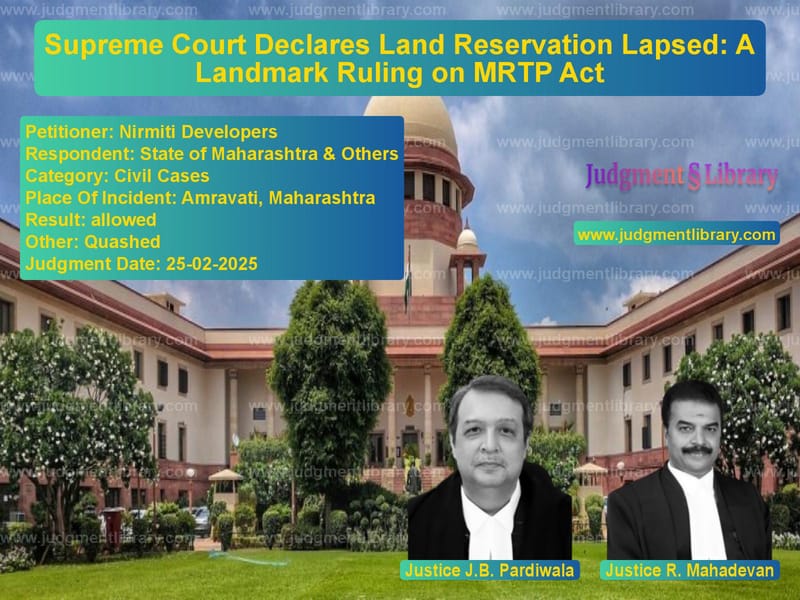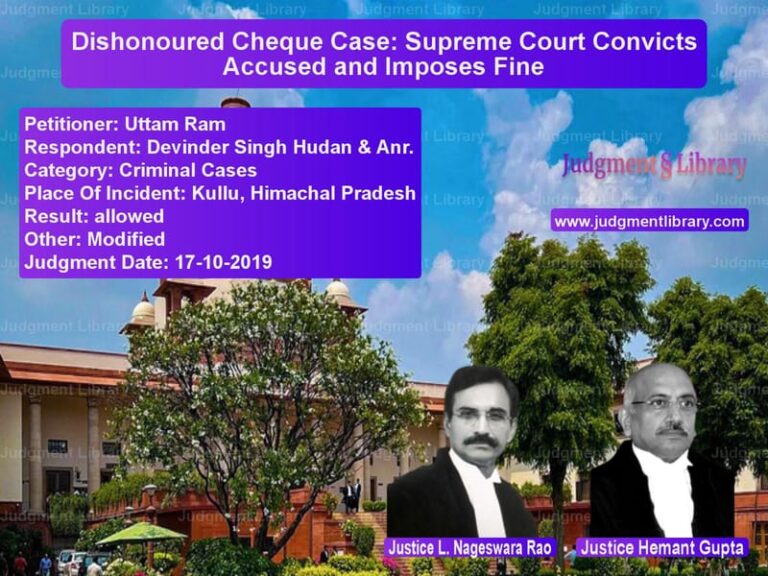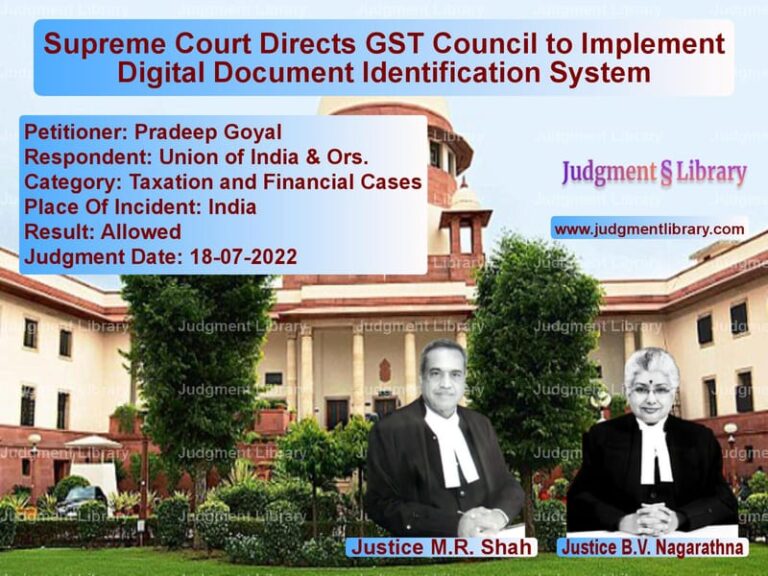Supreme Court Declares Land Reservation Lapsed: A Landmark Ruling on MRTP Act
In a significant ruling, the Supreme Court of India declared that the reservation of a plot under the Maharashtra Regional and Town Planning Act, 1966 (MRTP Act) had lapsed due to inaction by the authorities. The case involved a dispute over a land parcel in Amravati, Maharashtra, where the petitioner, Nirmiti Developers, sought de-reservation of land that had been earmarked for a school but was not acquired for over three decades. The Court ruled in favor of the appellants, setting aside the High Court’s decision and reaffirming the principles of land acquisition and reservation under the MRTP Act.
Background of the Case
The case originated when the original landowners submitted a layout plan for the development of a 2.47-hectare plot in Rajapeth, Amravati. A portion of this land, measuring 50,138 square feet, was reserved for a government school in the city’s development plan.
Despite the reservation, no acquisition proceedings were initiated for 13 years. The original owners then served a purchase notice under Section 49 of the MRTP Act in 2006, requesting either acquisition of the land or its release from reservation. The authorities failed to act within the stipulated period, leading the landowners to seek legal recourse.
Legal Proceedings and Arguments
Arguments by the Appellants
The appellants, Nirmiti Developers, who purchased the land in 2015, contended:
- The authorities failed to acquire the land within the prescribed time frame of one year after the purchase notice was issued.
- As per Section 49(7) of the MRTP Act, the reservation should be deemed to have lapsed, making the land available for development.
- The government’s delay of over three decades was unjustifiable, rendering the reservation void.
“Reservation cannot be used as a tool to indefinitely withhold property from its rightful owners. The failure to act within the statutory time frame mandates automatic lapsing of reservation.”
Arguments by the Respondents
The State of Maharashtra and Amravati Municipal Corporation argued:
- The original landowners did not take steps to develop the land for several years after filing the purchase notice.
- The land remained reserved as per the development plan and could not be released without following due process.
- The petitioner, as a subsequent purchaser, was not entitled to claim benefits under the de-reservation process initiated by the original owners.
“The purpose of the MRTP Act is to ensure planned development. Allowing landowners to seek de-reservation solely for commercial gains would defeat the purpose of city planning.”
Supreme Court’s Observations
The Supreme Court, after analyzing the MRTP Act and previous rulings, ruled in favor of the appellants, highlighting:
- The reservation of the land lapsed under Section 49(7) when no acquisition steps were taken within one year of the purchase notice.
- The authorities’ failure to act for over 30 years deprived the owners of their rights and violated the principles of fair compensation and transparency.
- The land could now be used for development as permitted under the city’s planning regulations.
“It does not make any good sense to keep a plot reserved in a development plan for 33 years without any action. The failure to acquire the land within the stipulated period results in automatic de-reservation.”
Final Judgment
The Supreme Court ruled:
“In the result, the appeals are allowed, and the impugned order passed by the High Court is set aside. It is declared that the reservation of the plot in question has lapsed by efflux of time in view of Sections 126 and 127 of the MRTP Act.”
Furthermore, the Court imposed costs of Rs.1,00,000 on the respondents for causing unnecessary delays and ordered the immediate release of the land for lawful development.
Impact of the Judgment
This ruling sets a critical precedent in urban planning and land acquisition laws in India. It reinforces the principle that reserved land must be acquired within the prescribed period, failing which the landowner regains full control over the property.
The decision also serves as a warning to planning authorities to act diligently and within statutory timeframes, preventing undue hardships to landowners.
Petitioner Name: Nirmiti Developers.Respondent Name: State of Maharashtra & Others.Judgment By: Justice J.B. Pardiwala, Justice R. Mahadevan.Place Of Incident: Amravati, Maharashtra.Judgment Date: 25-02-2025.
Don’t miss out on the full details! Download the complete judgment in PDF format below and gain valuable insights instantly!
Download Judgment: nirmiti-developers-vs-state-of-maharashtra-supreme-court-of-india-judgment-dated-25-02-2025.pdf
Directly Download Judgment: Directly download this Judgment
See all petitions in Property Disputes
See all petitions in Landlord-Tenant Disputes
See all petitions in Judgment by J.B. Pardiwala
See all petitions in Judgment by R. Mahadevan
See all petitions in allowed
See all petitions in Quashed
See all petitions in supreme court of India judgments February 2025
See all petitions in 2025 judgments
See all posts in Civil Cases Category
See all allowed petitions in Civil Cases Category
See all Dismissed petitions in Civil Cases Category
See all partially allowed petitions in Civil Cases Category







